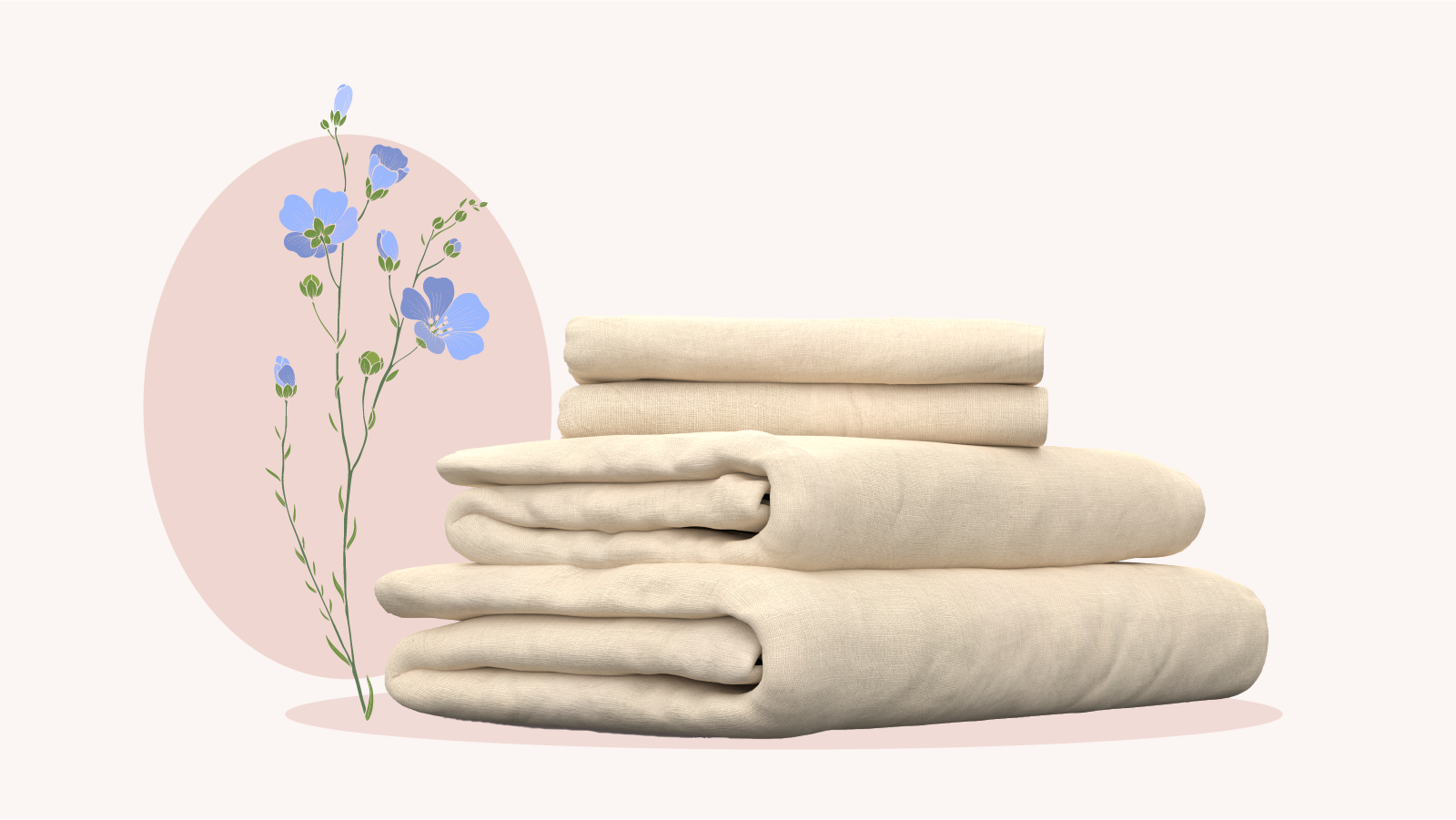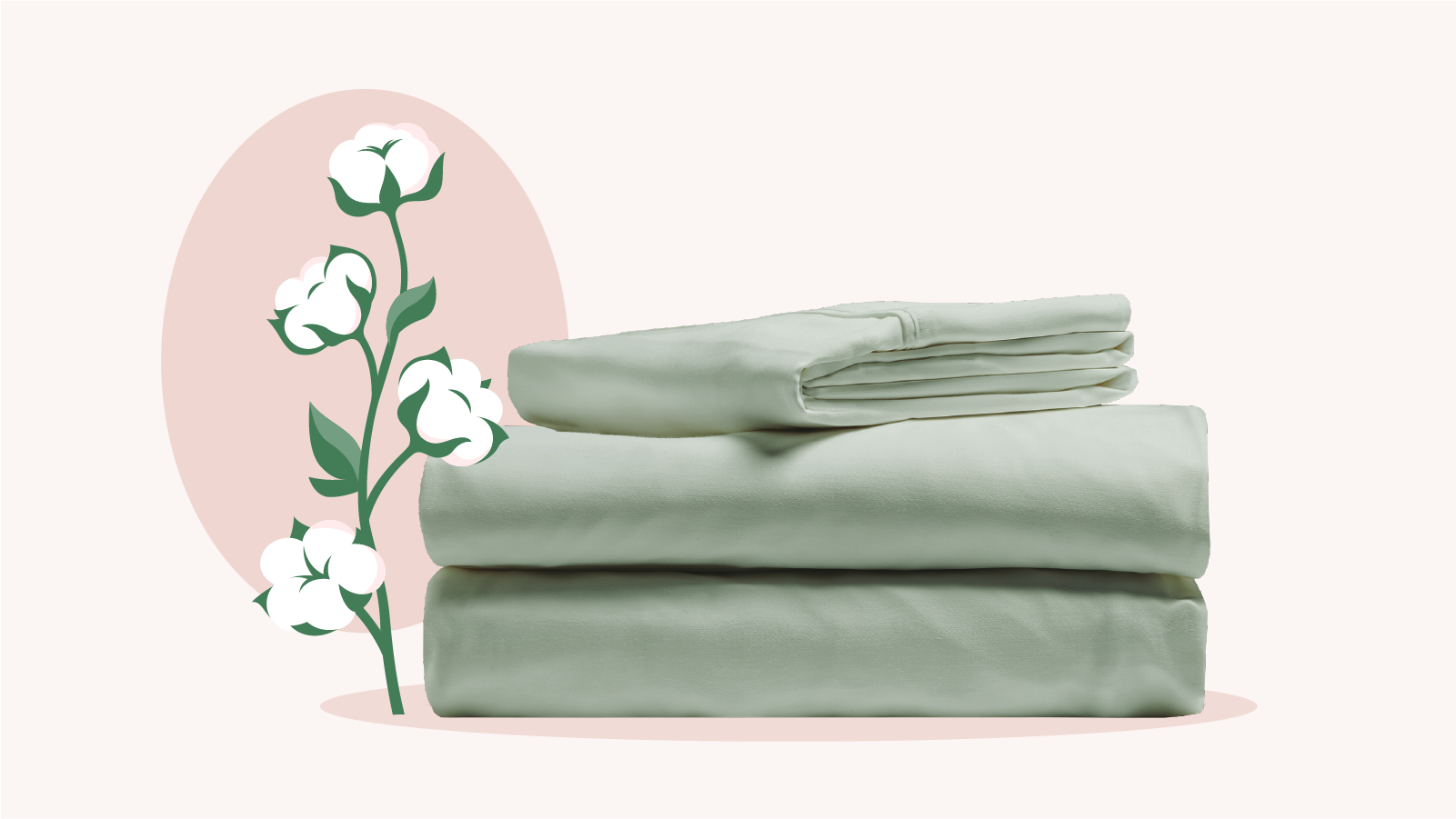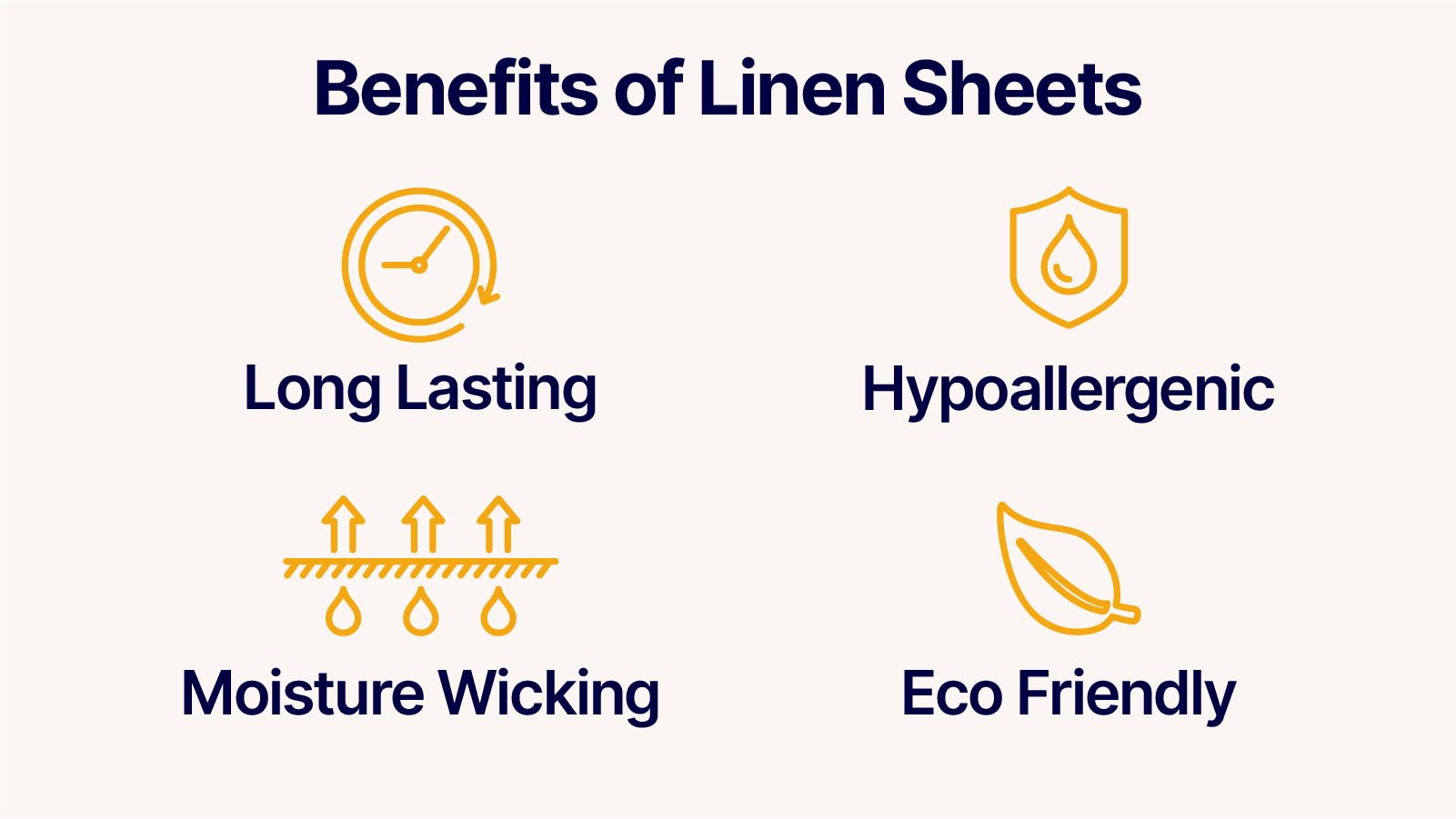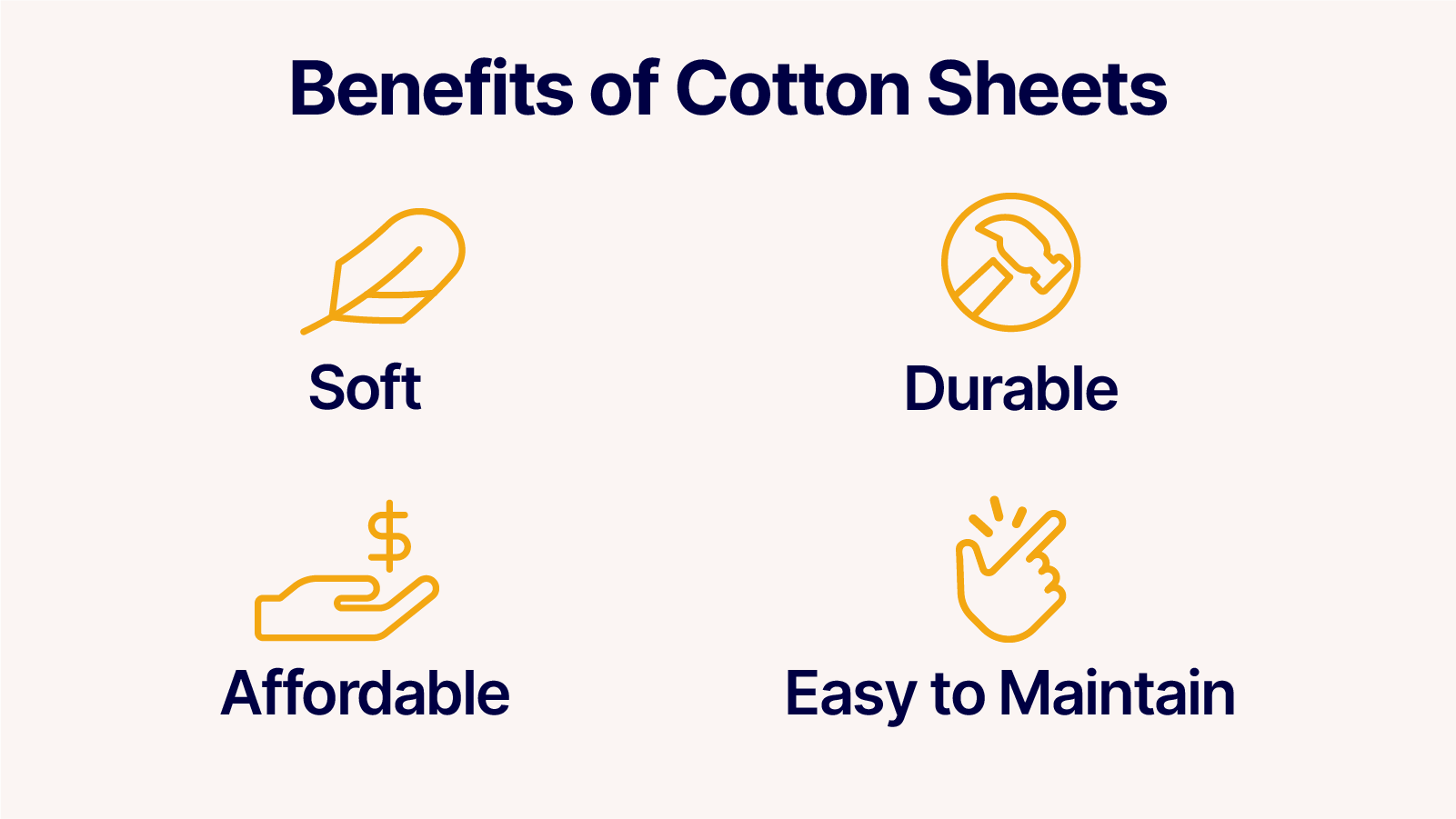Linen vs Cotton Sheets (2025)
Updated: March 31, 2025 | Published: July 17, 2024Deciding between linen bed sheets vs cotton can be challenging, especially if you don’t know the difference.
Linen sheets are durable and incredibly breathable, and their texture gets softer and softer with time. Cotton, on the other hand, is an old classic known for its cozy and familiar feel.
In this article, we’ll explore the key differences between linen sheets and cotton sheets so you can decide which option fits you best.
Breakdown: Linen vs. Cotton Sheets
| Factor | Linen | Cotton |
|---|---|---|
Cost | $150–400+ | $50–200+ |
Appearance | Textured, matte look that can wrinkle easily | Smooth, matte, or shiny finish; some weaves wrinkle easily |
Durability | Long-lasting with proper care | Long-lasting with proper care |
Machine Washable | Yes, but can’t be washed in hot water and may shrink in the dryer | Yes, but may shrink in the dryer |
Feel | Breathable, finely rippled texture that gets softer with washing | Soft, breathable feel |
Variety | Plain, Close Weave, Loose Weave, Damask & More | Percale, Sateen, Twill, Jersey & More |
Temperature | Regulates temperature even better than cotton | Regulates temperature well |

What Are Linen Sheets?
Linen sheets are made from the stalks of flax, a flowering plant. Flax cultivation requires much less water than cotton, making it more sustainable. Linen has a reputation for durability, and linen sheets usually last a long time.
Linen fibres are longer and thicker than cotton fibres, so linen tends to have a rougher appearance and a faint ripple-like texture. This also makes linen more breathable than cotton or bamboo sheets.
This rough feeling tends to go away after linen sheets are first washed, and they get softer with every washing. Many manufacturers stonewash their linen sheets during production so they’re soft right out of the package.
Like cotton sheets, linen sheets may be woven into different weaves that affect how the fabric feels against your skin:
- Plain-weave linen uses a simple one-thread-over, one-thread-under pattern, similar to percale weaves used in cotton sheets. Linen fabric with this weave has a noticeable “checkered” pattern.
- Close-weave linen is often called sheeting linen because it’s most often used to make bed sheets. The tighter weave makes this linen type more durable and softer than other linen types. It also isn’t as rough before being washed for the first time.
- Loose-weave linen is much more breathable and very absorbent. The trade-off, however, is that loose-weave linen is less durable. This makes loose-weave linen sheets less common than sheets woven from other linen types.
- Damask linen is woven with intricate, ornate patterns that are usually reversible. This makes the fabric slightly more textured than other linen types. Sheets made using damask linen are often marketed as luxury items.

What Are Cotton Sheets?
Cotton sheets are made from cotton plant fibres. Cotton requires much more water to grow than linen does, and it’s notably less durable. However, organic cotton is becoming more accessible as a green alternative.
Cotton sheets are one of the most common choices for bedding and can last a long time with proper care. They’re also easier to wash than sheets made from other fabrics, such as lyocell.
READ MORE: Lyocell vs cotton sheets: which is better?
There are many different kinds of cotton, such as Pima cotton, Egyptian cotton, and upland cotton. Cotton sheets also have a wide variety of weave types, which determines how they feel:
- Percale–weave cotton sheets use a one-thread-over, one-thread-under pattern. This creates a breathable and moisture-wicking design suitable for warm sleepers. Percale sheets also have a crisp, snappy feel.
- Sateen–weave cotton sheets use a one-thread-under, three-to-four-threads-over pattern that feels silky and has a subtle sheen. This type of sheet tends to retain more heat. You might also notice pilling in the fabric over time.
- Twill cotton sheets look like denim, with parallel ribs in a diagonal pattern. This type of cotton bedsheet is very durable, though it lacks the softness of other options.
- Jersey cotton sheets, similar to a favourite T-shirt, bring a stretchy and cozy feel to your sheets when you sleep.

Benefits of Linen Sheets
- Durable and long-lasting thanks to thick fibres
- Breathable and heat-dissipating to help you sleep cool
- Naturally hypoallergenic if you have allergies or sensitive skin
- More eco-conscious manufacturing compared to cotton sheets
Drawbacks of Linen Sheets
- Rough texture at first before being washed
- Can be significantly more expensive than other sheet types
- Can’t be washed in hot water, unlike other materials
- Will wrinkle much more easily than other fabrics

Benefits of Cotton Sheets
- Easier to wash and maintain than other sheet types
- Generally more affordable than linen sheets
- More weave options to cater to your specific needs
Drawbacks of Cotton Sheets
- Not as durable as most linen varieties
- Premium varieties like Egyptian cotton can be pricey
- Can be hotter to sleep in than linen
Which Is Better: Linen Bed Sheets vs Cotton?
Which is best for you? Whether you’re leaning toward linen vs cotton bed sheets, the best bed sheets for your needs will be a matter of personal preference. Both come in a variety of weaves and styles. Whichever kind you prefer, there’s a sheet set out there that works for you.
| Choose linen sheets if… | Choose cotton sheets if… |
|---|---|
|
|
READ MORE: What’s the best material for bed sheets?
FAQ
How do you tell the difference between linen and cotton?
Cotton is smoother to the touch, and is relatively stretchy and flexible. Linen has a coarser, faintly rippled texture that becomes softer the more it’s washed.
What’s the difference between flax and linen?
Flax is a flowering plant used to make linen, where it is cultivated and woven into linen cloth. It has been used to make clothing for thousands of years in hot countries, valued for its ability to stay cool and fresh in warm weather.
Which provides better cooling, linen or cotton?
Linen is generally better at keeping you cool than cotton. Although linen fibres are thicker, linen fabrics have a looser weave. This makes them more breathable than their cotton counterparts, so they do more to keep you cool and dry while sleeping at night.
That said, cotton sheets can also have good air circulation, depending on the type of cotton used, the weave, and the thread count. Egyptian cotton sheets, like those made by Douglas, have long and thin fibres in a tight weave. This makes them exceptionally breathable and good at dissipating heat.
When it comes to cooling, thread count is also important, especially for cotton sheets. Higher thread count sheets can be less breathable, which inhibits cooling. In general, cotton sheets should have a thread count of 400. This ensures a good balance between softness and breathability.
How do you wash linen sheets?
To wash linen sheets, use cold water on a gentle cycle with a mild detergent. Avoid hot water, which can cause linen to shrink once it starts to dry. For best results, wash your sheets by themselves. Hang your linen sheets to dry, or tumble dry on low heat.
How do you wash cotton sheets?
Most of the time, washing cotton sheets is as simple as throwing them in your washing machine and running them on a regular cycle. They can be washed at high temperatures, and either hung to dry or tumble-dried on normal heat.
Specific types of cotton sheets might have different care instructions, so always read the laundry tag to be sure.
Are linen sheets worth the money?
Linen sheets may be worth the investment if you value breathable, cooling bedding with a unique touch and feel. Authentic linen sheets (made of 100% flax) offer excellent temperature regulation, becoming softer with each wash. They provide long-term durability and sustainability, making them cost-effective over time. Ideal for hot sleepers or those in warm climates, linen sheets add an exotic aura to your bedroom and are a great choice for those prioritizing quality, comfort, and environmental friendliness.
How often should you wash your sheets?
You should wash your sheets once a week, no matter what material your sheets are made from. Not only does washing your sheets regularly help them last longer, but it also helps your entire bed last longer. It does a lot to help you sleep well and stay healthy, too.
Shop Linen Sheets Shop Cotton Sheets
Our goal is to provide the information you need to find the mattress that’s right for you. Get started with some of our most popular mattress shopping resources:
- Best Mattress Guides: Best Mattress Canada, Best Mattress In a Box
- Reviews: Douglas Original, Logan & Cove Choice, Juno, Octave Vista
- Comparisons: Douglas vs Endy, Douglas vs Casper
We use independent, third-party engineering firms (commissioned by us) with the APEGA stamp of approval to conduct mattress testing on our behalf, using publicly available data. We review and test all mattresses on 40+ criteria we think are important to you, including price, country of manufacture, sleep trial, warranty, features, materials used, motion isolation and edge support ratings, customer satisfaction reviews, returns, and refunds.
